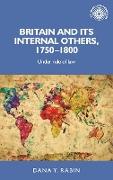Britain and Its Internal Others, 1750-1800
BücherAngebote / Angebote:
Britain and its internal others argues that the new emphasis on equality before the law in an age of imperial expansion was no coincidence. Common English men and women were bestowed - discursively at least - with rights and equality at the very moment that the British appropriated rights and property from colonial subjects. As Britain's empire expanded in the second half of the eighteenth century, its law managed interactions among peoples and cultures, linking metropole and colonies in a vast imperial legal web. It was at this time that rule of law became Britain's signature ideology, and a central justification for its imperial authority and superiority. Neither at home nor abroad did the rule of law emerge neatly from abstract principles of English justice, but was instead the product of imperial contact and collision. The English legal process sustained distinctions of race, ethnicity, gender, and class before the law, creating and protecting whiteness as a privileged category. The demands of internal others - Jews, Gypsies, Africans, Catholics, and Irish - for equality before the law drew them into the legal system, challenging longstanding notions of English identity and exposing contradictions in the rule of law. Revisiting six notorious legal events involving Britain's internal others in London's courtrooms, streets, and presses - the Jewish Naturalisation Act and the Elizabeth Canning case (1753-54), the Somerset Case (1772), the Gordon Riots (1780), the mutinies of 1797, and Union with Ireland (1800) - this study shows how contact with 'foreign' cultures and communities at home, particularly in London, promoted the ideology of rule of law in the service of empire.
Folgt in ca. 15 Arbeitstagen




